The Core i7-4770K is a mid-to-high-end processor released by Intel in 2013. Time has passed quickly, and eleven years have already gone by. Now, the Core i7 processors have upgraded and evolved from the fourth generation to the fourteenth.
This article will compare the gaming performance of the Core i7-4770K and the Core i7-14700K. The main purpose is to assess the gaming performance improvement when upgrading from the Core i7-4770K to the Core i7-14700K. It examines Intel’s technological advancements over the past decade and evaluates their significance.
01
Parameter Comparison of Core i7 4770K vs i7 14700K
The Core i7-4770K was released on June 2, 2013, using a 22-nanometer process. It features 4 cores and 8 threads, with a base operating frequency of 3.5 GHz and a maximum operating frequency of 3.9 GHz. It comes with 8MB of smart cache, has a standard power consumption of 84W, and a suggested retail price of $350.
The Core i7-14700K was released on October 17, 2023, utilizing a 10-nanometer process. It boasts 8 large cores, and 12 small cores, totaling 20 cores and 28 threads.
The base operating frequency is 3.4 GHz, with a maximum operating frequency of 5.5 GHz and an additional boost to 5.6 GHz. It features a 28MB L2 cache, a 33MB smart cache, standard power consumption of 125W, and a suggested retail price of $409.
02
Benchmark Performance Comparison of Core i7 4770K vs i7 14700K
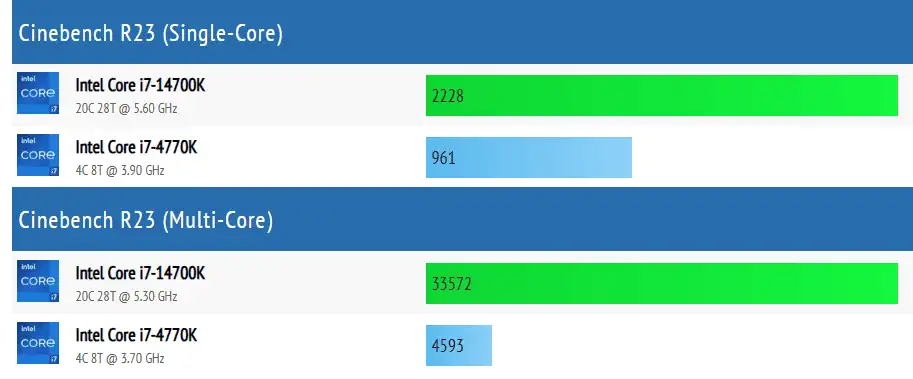
In the Cinebench R23 platform test, the Core i7-14700K achieves a single-core performance score of 2228 points and a multi-core performance score of 33572 points. In comparison, the Core i7-4770K scores 961 points in single-core performance and 4593 points in multi-core performance.
By calculation, the Core i7-14700K’s single-core and multi-core performance is approximately 2.3 times and 7.3 times that of the Core i7-4770K, respectively.
03
Test Platform Configurations
The main configurations are as follows:
For the Core i7-14700K, it is paired with the ASUS ROG Strix Z790-E Gaming motherboard, equipped with 32GB DDR5 6000MHz RAM. As for the Core i7-4770K, it is paired with the MSI Z97S motherboard and has 32GB DDR3 2133MHz RAM.
Other components remain the same, including the GeForce RTX 4090 graphics card, two Samsung 970 EVO M2 2280 1TB SSDs, and the Windows 11 operating system.
04
Game Benchmark Testing of Core i7 4770K vs i7 14700K
The following will conduct separate tests on seven games, all utilizing 1080P highest quality settings. In the series of images below, the left side represents the Core i7-4770K platform, while the right side represents the Core i7-14700K platform.
① The first game is “The Witcher 3”
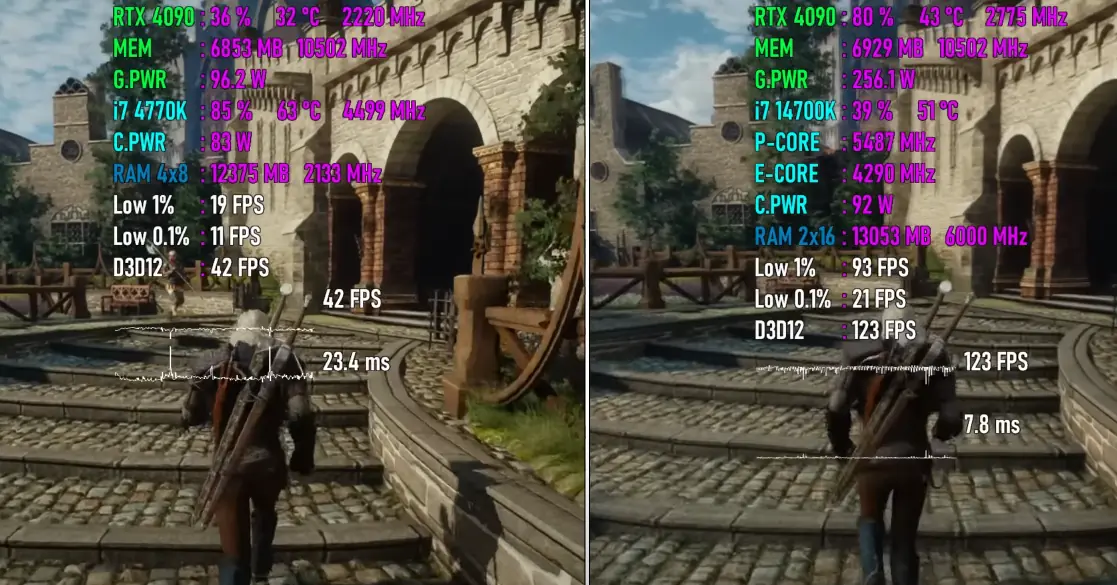
On the Core i7-4770K platform
- Average Frame Rate: 42 FPS
- Minimum Instantaneous Frame Rate: 19 FPS
- Frame Time: 23.4ms
- CPU usage: 85%
- CPU Power Consumption: 83W
- CPU Temperature: 63 degrees
- Memory usage: 12.4GB
- GPU usage: 36%
- Video Memory usage: 6.9GB
- GPU power consumption: 96W
- GPU Temperature: 32 degrees
On the Core i7-14700K platform
- Average Frame Rate: 123 FPS
- Minimum Instantaneous Frame Rate: 93 FPS
- Frame Time: 7.8ms
- CPU usage: 39%
- CPU Power Consumption: 92W
- CPU Temperature: 51 degrees
- Memory usage: 13.1GB
- GPU usage: 80%
- Video Memory usage: 6.9GB
- GPU power consumption: 256W
- GPU Temperature: 43 degrees
In this game, the Core i7-14700K platform has a CPU usage of around 40%, less than half of the opponent’s. Memory usage is higher by 0.7GB, GPU usage is approximately double that of the opponent, and video memory usage is the same.
In terms of average frame rate, the Core i7-14700K platform’s performance is about 2.9 times that of the Core i7-4770K platform. The minimum instantaneous frame rate is 4.9 times higher, the frame time is 33% of the opponent’s, CPU power consumption is only 9W higher than the opponent’s, and the temperature is 12 degrees lower.
② The second game is “Spider-Man: Miles Morales”
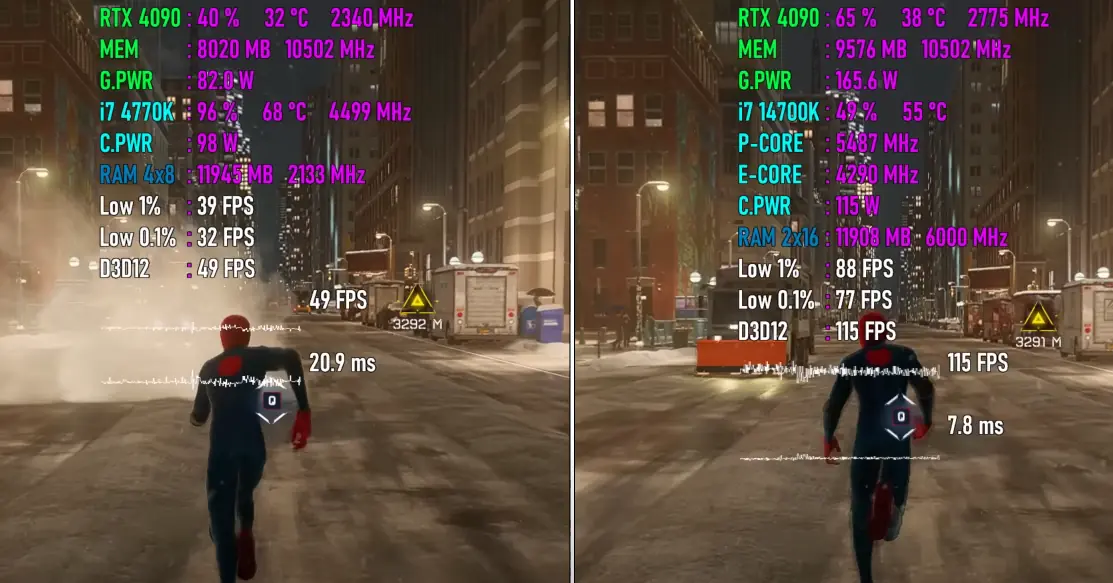
On the Core i7-4770K platform
- Average Frame Rate: 49 FPS
- Minimum Instantaneous Frame Rate: 39 FPS
- Frame Time: 20.9ms
- CPU usage: 96%
- CPU Power Consumption: 98W
- CPU Temperature: 68 degrees
- Memory usage: 11.9GB
- GPU usage: 40%
- Video Memory usage: 8.0GB
- GPU power consumption: 82W
- GPU Temperature: 32 degrees
On the Core i7-14700K platform
- Average Frame Rate: 115 FPS
- Minimum Instantaneous Frame Rate: 88 FPS
- Frame Time: 7.8ms
- CPU usage: 49%
- CPU Power Consumption: 115W
- CPU Temperature: 55 degrees
- Memory usage: 11.9GB
- GPU usage: 65%
- Video Memory usage: 9.6GB
- GPU power consumption: 166W
- GPU Temperature: 38 degrees
In this game, the Core i7-14700K platform’s CPU usage is nearly half of the opponent’s, while the Core i7-4770K platform’s CPU is approaching full load. Both platforms have equal memory usage, with GPU usage higher by 25% and video memory usage higher by 1.6GB.
In terms of average frame rate, the Core i7-14700K platform’s performance is about 2.3 times that of the Core i7-4770K platform. The minimum instantaneous frame rate is 2.3 times higher, the frame time is 37% of the opponent’s, CPU power consumption is 17W higher than the opponent’s, and the temperature is 13 degrees lower.
③ The third game is “Red Dead Redemption 2”
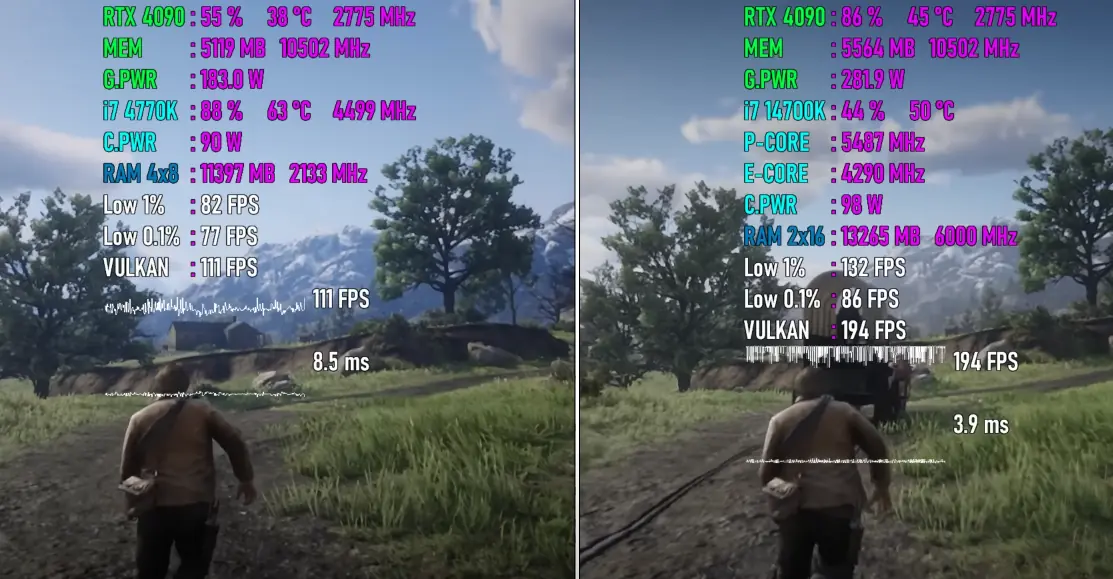
On the Core i7-4770K platform
- Average Frame Rate: 111 FPS
- Minimum Instantaneous Frame Rate: 82 FPS
- Frame Time: 8.5ms
- CPU usage: 88%
- CPU Power Consumption: 90W
- CPU Temperature: 63 degrees
- Memory usage: 11.4GB
- GPU usage: 55%
- Video Memory usage: 5.1GB
- GPU power consumption: 183W
- GPU Temperature: 38 degrees
On the Core i7-14700K platform
- Average Frame Rate: 194 FPS
- Minimum Instantaneous Frame Rate: 132 FPS
- Frame Time: 3.9ms
- CPU usage: 44%
- CPU Power Consumption: 98W
- CPU Temperature: 50 degrees
- Memory usage: 13.3GB
- GPU usage: 86%
- Video Memory usage: 5.6GB
- GPU power consumption: 282W
- GPU Temperature: 45 degrees
On the Core i7-14700K platform, the average frame rate is 194 FPS, with a minimum instantaneous frame rate of 132 FPS. The frame time is 3.9ms, CPU usage is 44%, power consumption is 98W, temperature is 50 degrees, memory usage is 13.3GB, GPU usage is 86%, video memory usage is 5.6GB, GPU power consumption is 282W, and temperature is 45 degrees.
In this game, the Core i7-14700K platform’s CPU usage is exactly half of the opponent’s, while the Core i7-4770K platform’s CPU usage is also high, approaching 90%. Memory usage is higher by nearly 2GB, GPU usage is higher by 31%, and video memory usage is higher by 0.5GB.
In terms of average frame rate, the Core i7-14700K platform’s performance is about 1.7 times that of the Core i7-4770K platform. The minimum instantaneous frame rate is 1.6 times higher, the frame time is 46% of the opponent’s, CPU power consumption is 8W higher than the opponent’s, and the temperature is 13 degrees lower.
④ The fourth game is “Microsoft Flight Simulator”
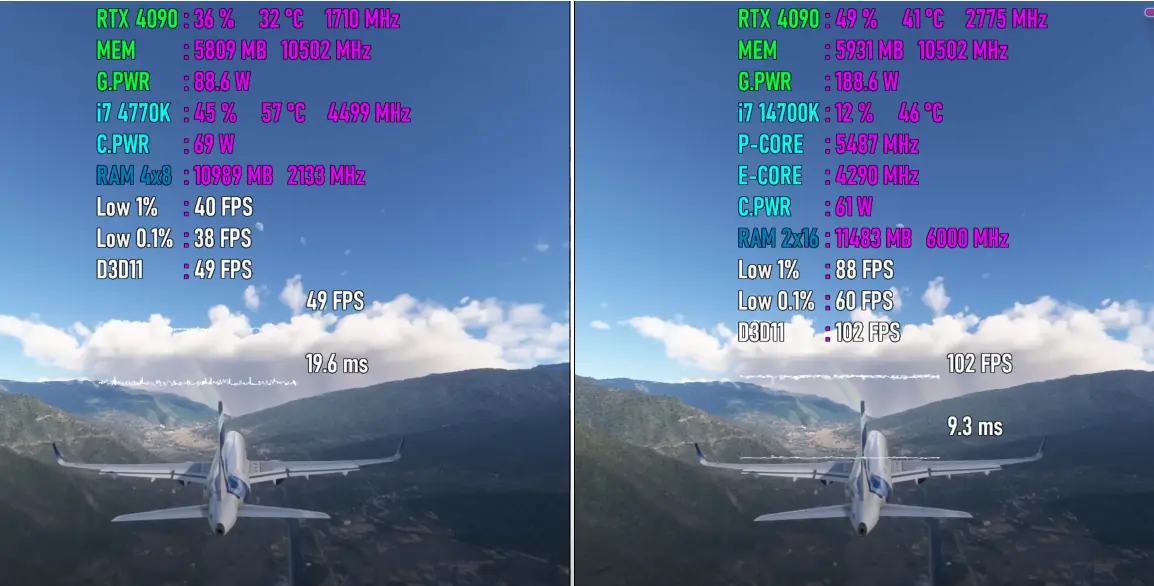
On the Core i7-4770K platform
- Average Frame Rate: 49 FPS
- Minimum Instantaneous Frame Rate: 40 FPS
- Frame Time: 19.6ms
- CPU usage: 45%
- CPU Power Consumption: 69W
- CPU Temperature: 57 degrees
- Memory usage: 11.0GB
- GPU usage: 36%
- Video Memory usage: 5.8GB
- GPU power consumption: 89W
- GPU Temperature: 32 degrees
On the Core i7-14700K platform
- Average Frame Rate: 102 FPS
- Minimum Instantaneous Frame Rate: 88 FPS
- Frame Time: 9.3ms
- CPU usage: 12%
- CPU Power Consumption: 61W
- CPU Temperature: 46 degrees
- Memory usage: 11.5GB
- GPU usage: 49%
- Video Memory usage: 5.9GB
- GPU power consumption: 189W
- GPU Temperature: 41 degrees
In this game, the Core i7-14700K platform’s CPU usage is 33% lower than the opponent’s, nearly only a quarter of the opponent’s. Memory usage is higher by 0.5GB, GPU usage is higher by 13%, and video memory usage is essentially the same.
In terms of average frame rate, the Core i7-14700K platform’s performance is about 2.1 times that of the Core i7-4770K platform. The minimum instantaneous frame rate is 2.2 times higher, the frame time is 47% of the opponent’s, CPU power consumption is 8W lower than the opponent’s, and the temperature is 11 degrees lower.
⑤ The fifth game is “Forza Horizon 5”
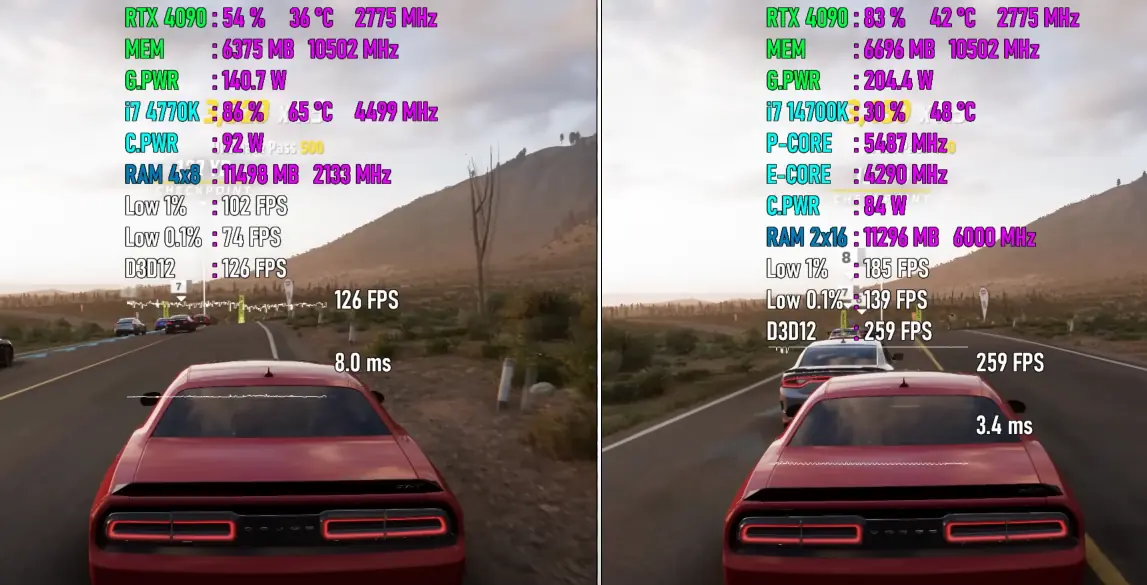
On the Core i7-4770K platform
- Average Frame Rate: 126 FPS
- Minimum Instantaneous Frame Rate: 102 FPS
- Frame Time: 8.0ms
- CPU usage: 86%
- CPU Power Consumption: 92W
- CPU Temperature: 65 degrees
- Memory usage: 11.5GB
- GPU usage: 54%
- Video Memory usage: 6.4GB
- GPU power consumption: 141W
- GPU Temperature: 36 degrees
On the Core i7-14700K platform
- Average Frame Rate: 259 FPS
- Minimum Instantaneous Frame Rate: 185 FPS
- Frame Time: 3.4ms
- CPU usage: 30%
- CPU Power Consumption: 84W
- CPU Temperature: 48 degrees
- Memory usage: 11.3GB
- GPU usage: 83%
- Video Memory usage: 6.7GB
- GPU power consumption: 204W
- GPU Temperature: 42 degrees
On the Core i7-14700K platform, the average frame rate is 259 FPS, with a minimum instantaneous frame rate of 185 FPS. The frame time is 3.4ms, CPU usage is 30%, power consumption is 84W, temperature is 48 degrees, memory usage is 11.3GB, GPU usage is 83%, video memory usage is 6.7GB, GPU power consumption is 204W, and temperature is 42 degrees.
In this game, the Core i7-14700K platform’s CPU usage is 56% lower than the opponent’s, nearly only a third of the opponent’s. Memory usage is lower by 0.2GB, GPU usage is higher by 29%, and video memory usage is higher by 0.3GB.
In terms of average frame rate, the Core i7-14700K platform’s performance is about 2.1 times that of the Core i7-4770K platform. The minimum instantaneous frame rate is 1.8 times higher, the frame time is 43% of the opponent’s, CPU power consumption is 8W lower than the opponent’s, and the temperature is 17 degrees lower.
⑥ The sixth game is “Hogwarts Legacy”
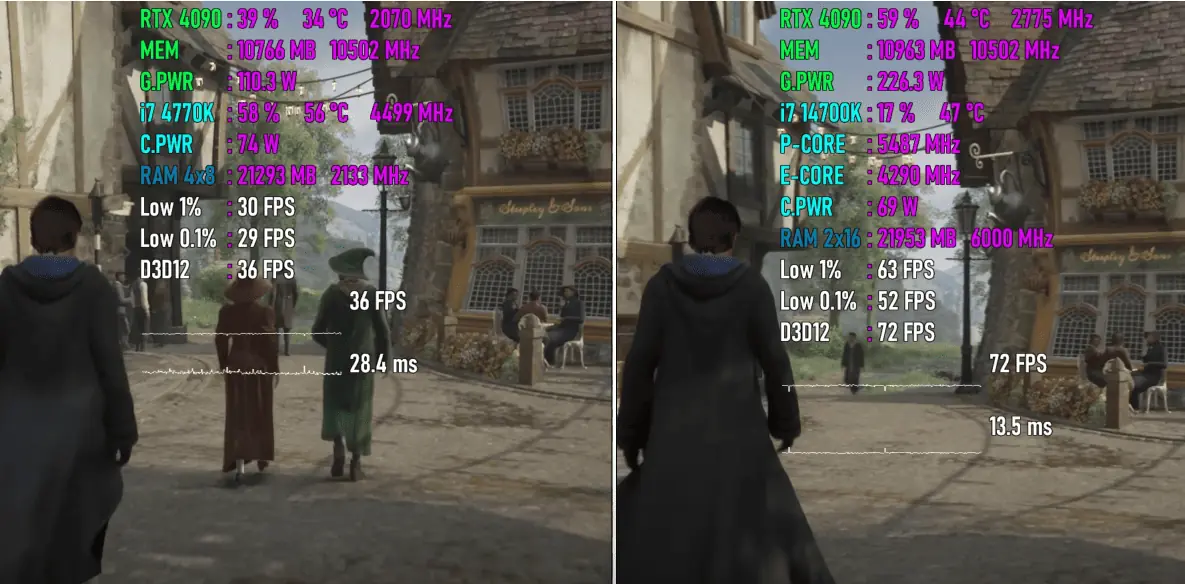
On the Core i7-4770K platform
- Average Frame Rate: 36 FPS
- Minimum Instantaneous Frame Rate: 30 FPS
- Frame Time: 28.4ms
- CPU usage: 58%
- CPU Power Consumption: 74W
- CPU Temperature: 56 degrees
- Memory usage: 21.3GB
- GPU usage: 39%
- Video Memory usage: 10.8GB
- GPU power consumption: 110W
- GPU Temperature: 34 degrees
On the Core i7-14700K platform
- Average Frame Rate: 72 FPS
- Minimum Instantaneous Frame Rate: 63 FPS
- Frame Time: 13.5ms
- CPU usage: 17%
- CPU Power Consumption: 69W
- CPU Temperature: 47 degrees
- Memory usage: 22.0GB
- GPU usage: 59%
- Video Memory usage: 11.0GB
- GPU power consumption: 226W
- GPU Temperature: 44 degrees
In this game, the Core i7-14700K platform’s CPU usage is 41% lower than the opponent’s, nearly only a third of the opponent’s. Memory usage is higher by 0.7GB, GPU usage is higher by 20%, and video memory usage is higher by 0.2GB.
In terms of average frame rate, the Core i7-14700K platform’s performance is exactly 2.0 times that of the Core i7-4770K platform. The minimum instantaneous frame rate is 2.1 times higher, the frame time is 48% of the opponent’s, CPU power consumption is 5W lower than the opponent, and the temperature is 9 degrees lower.
⑦ The seventh game is “Stellaris”
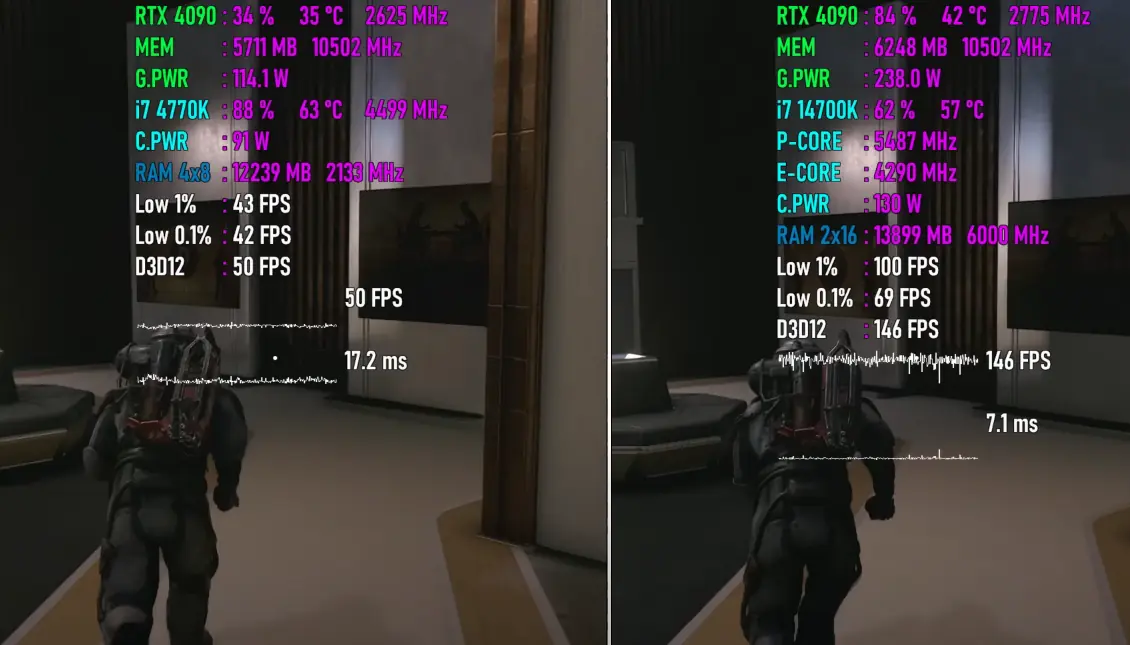
On the Core i7-4770K platform
- Average Frame Rate: 50 FPS
- Minimum Instantaneous Frame Rate: 43 FPS
- Frame Time: 17.2ms
- CPU usage: 88%
- CPU Power Consumption: 91W
- CPU Temperature: 63 degrees
- Memory usage: 12.2GB
- GPU usage: 34%
- Video Memory usage: 5.7GB
- GPU power consumption: 114W
- GPU Temperature: 35 degrees
On the Core i7-14700K platform
- Average Frame Rate: 146 FPS
- Minimum Instantaneous Frame Rate: 100 FPS
- Frame Time: 7.1ms
- CPU usage: 62%
- CPU Power Consumption: 130W
- CPU Temperature: 57 degrees
- Memory usage: 13.9GB
- GPU usage: 84%
- Video Memory usage: 6.2GB
- GPU power consumption: 238W
- GPU Temperature: 42 degrees
On the Core i7-14700K platform, the average frame rate is 146 FPS, with a minimum instantaneous frame rate of 100 FPS. The frame time is 7.1ms, CPU usage is 62%, power consumption is 130W, temperature is 57 degrees, memory usage is 13.9GB, GPU usage is 84%, video memory usage is 6.2GB, GPU power consumption is 238W, and temperature is 42 degrees.
In this game, the Core i7-14700K platform’s CPU usage is 26% lower than the opponent’s, memory usage is higher by 1.7GB, GPU usage is higher by 50%, and video memory usage is higher by 0.5GB.
In terms of average frame rate, the Core i7-14700K platform’s performance is about 2.9 times that of the Core i7-4770K platform. The minimum instantaneous frame rate is 2.3 times higher, the frame time is 41% of the opponent’s, CPU power consumption is 39W higher than the opponent’s, and the temperature is 6 degrees lower.
05
Comparative Conclusions of Core i7 4770K vs i7 14700K
Setting aside specific metrics such as CPU and GPU usage rates, focusing on the average frame rate as the most crucial benchmark, the gaming performance of the Core i7-14700K platform is approximately 2.3 (2.28) times that of the Core i7-4770K platform. This aligns closely with the difference in single-core performance between the two processors.
Specifically, the performance gap between Core i7-4770K and Core i7-14700K is substantial. In gaming tests, the maximum GPU usage achievable by Core i7-4770K is only 55%, while Core i7-14700K reaches 86%. Additionally, the CPU usage of Core i7-14700K is significantly lower than that of Core i7-4770K.
Moreover, in the tests, Core i7-14700K demonstrates lower power consumption and temperatures in most scenarios compared to Core i7-4770K, showcasing a significant overall advantage with a considerable disparity.
It is essential to emphasize that game performance tests may not comprehensively and objectively reflect all performance differences between these two processors, especially in multi-core performance. In other application scenarios, the gap between them may be more significant. The conclusions drawn in this article are for reference purposes only.




